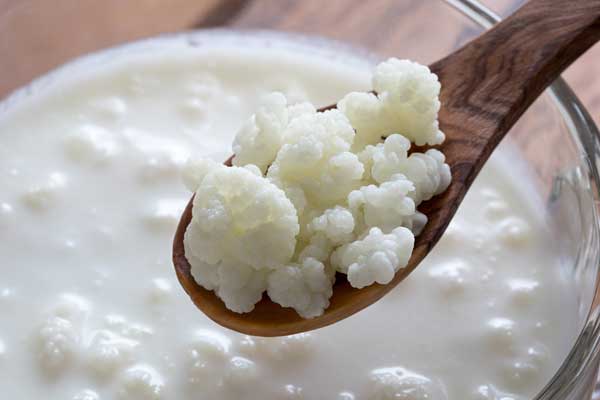Kefir, derived from the Turkish word “keyif,” meaning feeling good after eating, has been gaining popularity in the natural health community. Often considered a more potent version of yogurt, kefir is a fermented dairy drink with a fascinating history and an array of health benefits. In this article, we delve into five of the top health benefits of kefir, exploring its nutritional value and its impact on digestion, bone health, and lactose intolerance.

The Science Behind Kefir
Kefir is a unique fermented drink traditionally made with cow’s or goat’s milk. The process involves adding kefir grains, which are not actual grains but cultures of yeast and lactic acid bacteria, to milk. These microorganisms multiply and ferment the milk, transforming it into kefir. During fermentation, lactose is converted into lactic acid, giving kefir its characteristic sour taste.
Nutritional Powerhouse
A serving of milk kefir is a nutritional powerhouse, providing essential nutrients such as protein, calcium, Vitamin B-12, Vitamin B-2, magnesium, and Vitamin D. We’ll break down the nutritional content and explain how kefir can fit into a balanced diet.
Kefir as a Probiotic Champion
Kefir outshines yogurt as a probiotic source, boasting approximately 30 strains of bacteria and yeasts. We’ll explore how these probiotics can influence health, including their potential in weight management, mental well-being, and digestive health.
Digestive Harmony with Kefir
Probiotics like those in kefir have the potential to restore the balance of healthy bacteria in the gut. We’ll delve into the evidence supporting the use of probiotics and probiotic foods, including kefir, for managing digestive issues like irritable bowel syndrome (IBS) and ulcers.

Strengthening Bones with Kefir
Osteoporosis, a condition characterized by bone deterioration and a higher risk of fractures, can be mitigated with adequate calcium intake. Kefir, especially when made from full-fat dairy, offers calcium and Vitamin K, which play a vital role in bone health. We’ll discuss how kefir can potentially reduce the risk of fractures and improve bone density.
Kefir’s Lactose Tolerance
Many individuals struggle with lactose intolerance, making dairy consumption a challenge. We’ll explore how the lactic acid bacteria in kefir help break down lactose, making it a suitable option for those with lactose intolerance. Additionally, we’ll touch on how you can make lactose-free kefir using alternative liquids.
Conclusion
In conclusion, kefir is a nutritional powerhouse with numerous health benefits. From its probiotic-rich composition to its positive impact on digestion, bone health, and lactose intolerance, kefir deserves its status as a superfood in the natural health community. Incorporating kefir into your diet can be a delicious and nutritious way to boost your overall well-being.
